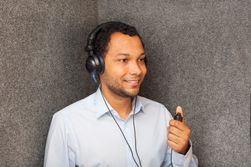What to Know About Hearing Testing

If you’ve noticed your hearing decreasing over time, you might wonder if you’re a viable candidate for a fitted aid. Before your doctor can prescribe one, though, you’ll need to undergo hearing testing. During this exam, your doctor will measure your baseline to determine how much assistance is needed. After your exam, otherwise known as an audiogram, you can use the following guide to interpret and understand your results.
What Is an Audiogram?
An audiogram refers to a chart that is used to measure your ability to hear sounds across a range of frequencies. Doctors use them to plot your varying thresholds depending on the type of sound you’re exposed to. It uses the softest sound you can pick up about 50% of the time to determine your lowest threshold.
How Do Audiograms Measure Hearing?
 Your audiogram will feature a graph with two different axes. The vertical one represents the intensity of different sounds in decibels, while the horizontal one represents low to high frequencies.
Your audiogram will feature a graph with two different axes. The vertical one represents the intensity of different sounds in decibels, while the horizontal one represents low to high frequencies.
The decibels range from 0 dB, which is the softest sound a person with normal hearing can detect, to 120 dB. The frequencies range from 250 Hertz (Hz) to 8000 Hz. Often, you are given a clicker to confirm any noises you can detect.
What Is a Normal Hearing Range?
Most adults who are thought to have a normal range of hearing can pick up on sounds anywhere from 0 to 25 dB, with frequencies ranging across the entire spectrum. If you have difficulty picking up on any sounds above 25 dB, your doctor might prescribe you with hearing loss.
The severity of that loss will depend on the unique results of your hearing test. For example, being able to pick up on sounds between 30 to 40 dB might be considered mild, while those who fall in the 90 to 120 dB might have profound hearing loss.
If you think you need hearing testing, turn to the professionals at Ear Nose & Throat Specialties PC in Lincoln, NE. Since 1991, they have provided patients throughout the area with a broad range of services, from allergy treatment to customized hearing aids. Visit their website to learn more about what they do, and call (402) 488-5600 to schedule an appointment.
About the Business
Have a question? Ask the experts!
Send your question

